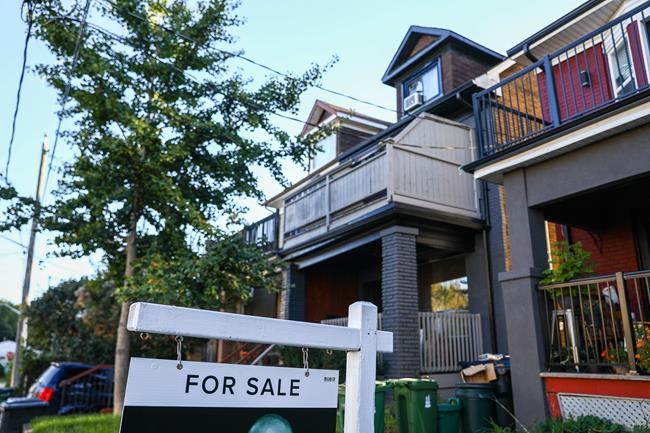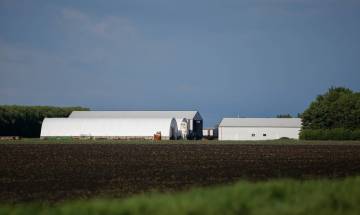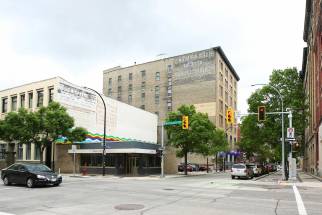No signs of cooling in city’s hot housing market Second-best May on record in Winnipeg as most of the country saw declines of nearly 22 per cent
Read this article for free:
or
Already have an account? Log in here »
To continue reading, please subscribe:
Monthly Digital Subscription
$0 for the first 4 weeks*
- Enjoy unlimited reading on winnipegfreepress.com
- Read the E-Edition, our digital replica newspaper
- Access News Break, our award-winning app
- Play interactive puzzles
*No charge for 4 weeks then price increases to the regular rate of $19.00 plus GST every four weeks. Offer available to new and qualified returning subscribers only. Cancel any time.
Monthly Digital Subscription
$4.75/week*
- Enjoy unlimited reading on winnipegfreepress.com
- Read the E-Edition, our digital replica newspaper
- Access News Break, our award-winning app
- Play interactive puzzles
*Billed as $19 plus GST every four weeks. Cancel any time.
To continue reading, please subscribe:
Add Free Press access to your Brandon Sun subscription for only an additional
$1 for the first 4 weeks*
*Your next subscription payment will increase by $1.00 and you will be charged $16.99 plus GST for four weeks. After four weeks, your payment will increase to $23.99 plus GST every four weeks.
Read unlimited articles for free today:
or
Already have an account? Log in here »
Hey there, time traveller!
This article was published 16/06/2022 (1271 days ago), so information in it may no longer be current.
Winnipeg is an outlier in the national housing market.
While most of Canada saw a decline in house sales last month, the prairie city recorded its second best May on record.
“We’re not in the stratosphere like some other markets, where… especially first-time home buyers are unable to even look at anything that’s available,” said Peter Squire, the Winnipeg Regional Real Estate Board’s head of market intelligence.
May home sales down 22% since last year: CREA

Posted:
Canada's housing market continued to cool last month with the country's real estate association finding home sales dropped by nearly 22 per cent since last year and almost nine per cent between April and May.
The WRREB recorded 1,723 house sales last May, up four per cent over the five-year average. It’s an 18 per cent jump from April’s count of 1,461.
Last month’s sales fell 14 per cent below May of 2021, which boasted a record of over 2,000.
Nationally, Canada’s housing market has cooled, dropping nine per cent between April and May and nearly 22 per cent year-over-year.
“We’re a more affordable housing market, so we’re not as impacted as those much more expensive markets with the higher interest rate environment,” Squire said.
The Bank of Canada has raised its key interest rate to 1.5 per cent this year. It’s expected to increase the rate in July, and possibly again later.
The looming rate hikes spurred Rachel Melsness, 23, and her husband to buy their first home.
“We wanted to get into the market as soon as possible,” Melsness said.
She and her husband were approved for a fixed rate of 2.75 per cent on their mortgage.
They bought their St. Vital home in early May, after spending months examining around 20 places. The market was shocking, Melsness said.
“There was a house that had a crumbly basement, and it was mouldy,” she said. “It sold for… at least $50,000 over.”
On May 8, the Melsnesses looked at their current home. They faced two other bidders.
“We just went full out on our max (budget),” Melsness said. “We were like, ‘This is what we can do. We’ll see if we get it.’”
The next day, she heard she’d been accepted. She and her husband moved from their Pembina Highway apartment, escaping a potential eight per cent rent increase.
More listings came onto the market last month, giving buyers more choice, Squire said. There were 2,747 active listings, a decrease of less than one per cent from last year.
“There was a house that had a crumbly basement, and it was mouldy. It sold for… at least $50,000 over.” – Rachel Melsness
“Our May was, in some ways, a catch-up month to what wasn’t happening earlier in the year,” Squire said.
A harsh winter and overland flooding kept Manitobans from buying and selling earlier.
“We really had a lack of listings right through the first four months,” Squire said. “Those lack of listings obviously put some pressure on our prices.”
In May, the average single family detached home cost $454,832, according to the WRREB. It’s a more than $10,000 increase from the $447,421 of April, and a significant jump from May 2021’s average $387,338.
Still, Winnipeg and surrounding communities are cheaper than much of Canada, Squire noted.
He doesn’t expect housing prices to increase significantly in the province. They could decline, but they won’t decrease to pre-pandemic levels, Squire said.
About two in three single family homes and one in three condos end in bidding wars, he said.

“So far, June is looking solid for sales,” he added.
But, the potential interest rate increases could mean a slowdown in Manitoba’s housing sales.
“It’s not safe to say that we’re not going to be impacted,” Squire said. “It’s just going to be, to what extent will we be impacted?”
A higher interest rate — and more expensive mortgages — has likely contributed to the decline in house purchases across the country.
May sales decreased in three-quarters of all local markets, including the Lower Mainland in British Columbia, Calgary, Edmonton, the Greater Toronto Area and Ottawa.
“We really had a lack of listings right through the first four months,” Squire said. “Those lack of listings obviously put some pressure on our prices.” – Peter Squire
“In some cases, it will be a bit of a positive in that we’re going to see more movement towards a balanced market,” Squire said. “There will be more listings to choose from.”
It also means some people who may have been able to afford a house pre-rate hike now can’t, he said.
“Ultimately this has been expected and forecast for some time — a slowdown to more normal levels of sales activity and a flattening out of prices,” Shaun Cathcart, the Canadian Real Estate Association’s senior economist, said in a release.
The dollar volume of house sales in Winnipeg and surrounding areas was $690.4 million by the end of May.
The average price of an attached home was $358,087. An average condo cost $261,910.
In May of 2021, a typical attached home and condo cost $298,333 and $254,928, respectively.
– With files from the Canadian Press
gabrielle.piche@winnipegfreepress.com

Gabby is a big fan of people, writing and learning. She graduated from Red River College’s Creative Communications program in the spring of 2020.
Our newsroom depends on a growing audience of readers to power our journalism. If you are not a paid reader, please consider becoming a subscriber.
Our newsroom depends on its audience of readers to power our journalism. Thank you for your support.









